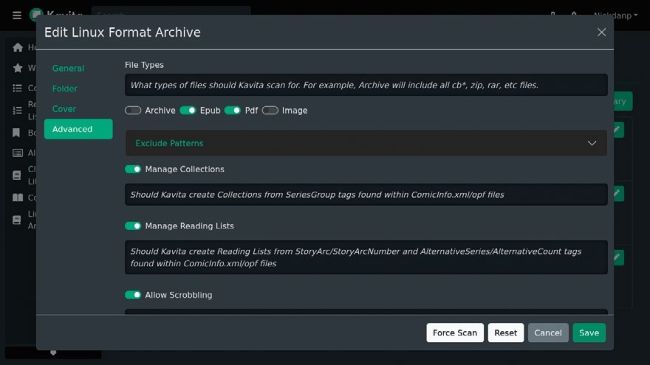KAVITA
Build a streaming ebook library
Bionic bookworm Nick Peers looks at a free tool that enables you to collate, read and share your digital publications over the internet.
Credit: www.kavitareader.com
OUR EXPERT
Nick Peers has more paper and digital publications than he cares to admit. Maybe Kavita can help the digital library look less chaotic than the piles of paper and magazines filling his office.
Kavita
does for your digital books and comics what Audiobookshelf does for your digital audiobooks – it provides easy access to all your ebooks via a web browser or app, at home and further afield. Although geared towards comic book users and manga fanatics, there’s enough in Kavita to suit those who simply want a user-friendly home to manage, read and share their digital publications.
Put up a bookshelf
If you want to install Kavita natively on your system, head to https://wiki.kavitareader.com/en/install/linuxinstall for instructions. It involves saving the correct build of the latest release at https://github.com/Kareadita/Kavita/releases to your hard drive, then extracting the .tar.gz archive to a writable directory of your choice, making it executable ( chmod +x ./Kavita ), and running the app directly ( ./Kavita ). You’ll also find instructions for installing Kavita as a Systemd service.
If you’re adding
Kavita
to your server, you may prefer to run it containerised – you’ll find instructions for
Docker
at the
Kavita
wiki, where there are multiple options, including a
LinuxServer.io
version for those who want to run
Kavita
under their own user account.
We’ve also successfully tested the official container with Podman as a rootless container with the following:

Each library can be configured to contain a broad range of file types, or you can restrict it to just the common formats (PDF and EPUB).
You obviously need to adapt the two -v lines to point to your ebooks folder on the one hand, and the location where you plan to store Kavita’s configuration files on the other. We’ve also assumed you’re running Podman through your own user account, which has a UID and GID of 1,000.
QUICK TIP
Looking for content with which to populate your library? You can find free books from several legal sources, including Project Gutenberg (www. gutenberg. org) and the Internet Archive (https:// archive.org).
ORGANISE YOUR FILES
The secret to a tidy library is file organisation. Kavita relies on you to properly file everything in a logical manner so it can concentrate on scanning through your content. Start by organising the material into separate libraries if that’s applicable – each library needs its own folder inside a parent directory.
From here, how you organise your files depends on the file type. EPUB files, for instance, just can be thrown in haphazardly (or organised by folder and subfolder such as author or genre) – Kavita still treats each book as its own unique series based on its metadata.
PDF files, however, are treated differently. Because there’s no metadata to speak of, Kavita relies on the folder structure to organise them. This organisation extends to placing each set of files in a grouped folder that is treated as a series. The folder’s name then becomes the series title, while the filename is also the book’s title within Kavita itself.
Don’t worry too much about trying to apply organisation. As you’ll see from the main copy, Kavita provides many ways to view your collection, with smart filters the most flexible. You can also edit your library’s metadata, as the step-by-step guide reveals (see page 52), ensuring even PDF files can be populated with key information like author and genre to help you organise them.